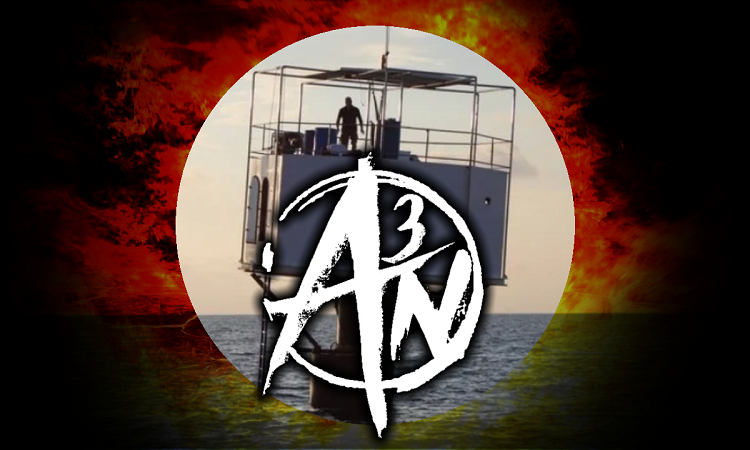
SEASTEADING CASE STUDIES: LEARNING FROM THE FAILED ATTEMPTS OF THE PAST (& PRACTICAL LIBERATED LIFESTYLES ON THE HIGH SEAS)
For thousands of years, land has provided mankind the optimal headquarters for living (and in many ways, for some, it still does). Two important things have happened to alter this previous state. One, the advent of urbanization, or the corralling of large amounts of people into small areas and, two, various governments’ jurisdictional claims to 99.9% of all land in the world, including the most obscure, uninhabited islands.
A large number of folks’ subjective preferences (or current needs) lead them to remain in the cities, but there are those seeking a “return to the land” in the form of off-grid homesteading—“we” just want to be left alone with nature; but it can’t be forgotten that with governments and their corporate counterparts being the control freaks they are, it may not always be a possibility. Combine this with megabanks further centralizing control of land at an extremely rapid pace and, as Tom Marshall (Rayo), a freedom pioneer in the 1960s and 70s said, it just may be time to, “Apply your free market principles by setting sail for sunnier waters.”
And he was right—the “homesteading” of the sea (seasteading) will play (and is playing) an inevitable role in the future of human freedom and survival.
The most popular project with any notoriety would be The Seasteading Institute, but little known, there were also a few attempts at founding new libertarian countries in the open ocean in the mid-20thcentury.
For purposes of historical relevance, as well as potential lessons for current and future seasteaders, let’s take a look at their failed efforts to see where they went wrong.
(Author’s Note: Due to the scarcity of resources at the time this article “goes to press,” specific years may not always be provided. The resources referenced are: “The Nation Builders’ Struggle.” Brian Doherty’s “Radicals for Capitalism,” Rayo’s “Vonu: The Search for Personal Freedom,” Roy Halliday’s “Operation Atlantis,” Erwin Strauss’ “How to Start Your Own Country,” and some updates on the projects from Wikipedia.)
The Free Isles Project
The Free Isles Project was a venture that spawned out of the Preform-Inform movement and the Innovator libertarian zine in the 1960s. The goal was to conduct research on the efficacy of setting up a new libertarian country, solutions to potential obstacles, and the seemingly endless possibilities if it were to come into fruition.
This project continued for a handful of years, but it never got past the talking stage. Eventually, the movement subsided after disagreements arose regarding the size and scope of government, the lack of individuals willing to become involved, and the potential ramifications from existing nation states.
Nonetheless, the Free Isles Project seems to be the origin of these ventures and influenced at least one, if not all, of the projects below.
Operation Atlantis
From the outset, the Free Isles Project was just a research effort. The first actual attempt at bringing a new libertarian nation into fruition was Werner Stiefel’s Operation Atlantis.
The plan was laid out in three stages: “(1) gather libertarians in a single location, (2) acquire an ocean vessel and declare it to be an independent nation while in international waters, and (3) create ‘an artificial island as close to the shores of the U.S. as international law will permit and Uncle Sam will tolerate.’”
Furthermore, according to Brian Doherty in his book, Radicals for Capitalism, their goal was to “eventually obtain sovereignty over some island…and turn it into a fresh new country.” From there they would have their base of operations and would start to build artificial platforms which would hopefully coalesce into the actual objective—a floating nation on the water.
The location he chose for recruiting libertarians was a hotel he had purchased in Saugerites, New York, which is right on the Hudson River, giving them easy water access to the Atlantic Ocean.
From scratch, they constructed a boat out of rebar and cement and set sail, only to have their vessel tip over and catch fire in the Hudson River. Persevering, they were able to navigate the vessel to the Silver Shoals area (near the Bahamas) when their ship sank.
Luckily, Steifel had already negotiated a 220-year lease for some land on the Haitian island, Tortuga, with the agreed-upon reason being for a small commercial chemical-mixing plant. But once the Haitians learned of their plan to start a floating nation (from their own publication), President Jean-Claude Duvalier drove them out of the area, as it had already been slated for other purposes.
It is reported by Erwin Strauss, author of How to Start Your Own Country and visitor to the hotel, that “Mr. Stiefel was approaching the enterprise as a Sunday afternoon diversion,” while focusing most of his time and effort on his pharmaceutical company. Strauss attributes that as one of the many reasons the dream of Atlantis died.
Michael Oliver’s, “The Capitalist Country”
Michael Oliver was a Lithuanian-born concentration camp survivor who set out to found “The Capitalist Country” in 1968.
He investigated many areas for his new nation and attempted to solidify purchases of land from countries with little government, but it was to no avail until Minerva was founded in 1972. Oliver and his crew laid claim to “two small coral atolls in the South Pacific, 400 miles south of Fiji,” and 260 miles northeast of the Kingdom of Tonga. Notices were sent to nations and they began dredging, capping out at 15 acres before running out of investment capital—far below their goal of 2,500 acres.
Doherty reports that the “project was breaking apart over personal squabbling” and that “…Oliver was washing his hands of the whole thing.”
Surrounding island countries caught wind of the venture and understood the negative ramifications if it were allowed to succeed. Then, on February 23, 1972, a box of supplies was dropped, labeled, “supplied and maintained by the government of Tonga.” The actions by the Tongan government were supported by many surrounding island countries. And, in the blink of an eye and with one gun boat, Minerva was conquered by the king of Tonga.
After that, Oliver pursued other strategies in founding his nation until he finally returned to the original goal—building artificial ocean cities. In the early 1990s, he set out to found the country of Oceania and penned the venture as the already known and nostalgic Atlantis Project. In less than a couple of years, it ended, and at oceania.org it still reads:
“The Atlantis Project, which proposed the creation of a floating sea city named Oceania, began in February 1993, receiving nationwide publicity from The Art Bell Show, Details Magazine, The Miami Herald, Boating Magazine, and worldwide publicity in Canada, New Zealand, Hong Kong, England, and Belgium. The project ended in April of 1994.”
Sea City “Taluga”
In 1969, the Cortez Development Corporation set out to found Sea City Taluga, a project focused primarily on tourism and recreation, rather than libertarian ideals like the previous case studies. Nonetheless, they still planned on setting up an autonomous government, albeit structured more like a corporation’s board of trustees than a traditional one.
The location chosen was Cortez Bank, an area allegedly claimed by no government 100 miles west of Mexico. In the most complete article written on the subject of new libertarian nations, John L. Snare claims that, “The bank rises from the deep ocean floor and is not on the continental shelf by any accepted geological or legal definition.”
Phase 1 was estimated to cost $350 million (keep in mind the year) and the entire project a substantial $2 billion—it was a MAJOR undertaking.
But unfortunately, sometime after 1972, the U.S. government declared that the bank, as part of the continental shelf, was US territory. The plan died and all capital investment in the project was wasted.
What Can We Learn?
Let’s first revisit why these projects failed or came to an end:
- The Free Isles Project: It was purely a research venture and the participants deemed it to be an inefficacious pursuit.
- Operation Atlantis: It seems they weren’t completely honest in their contractual agreement with Duvalier, and therefore, he drove them out of the area when they started work on the floating nation.
- Operation Minerva: Their fate was sealed by infighting, a lack of funding, and an embarrassing lack of defense.
- Oceania/Operation Atlantis II: It was simply a lack of funding and interest.
- Sea City Taluga: The US caught wind of the project and declared the continental shelf US territory.
Two terms need to be defined to make sense of this (from Wikipedia):
- Contiguous Zone (CZ): A band of water extending from the outer edge of the territorial sea up to 24 nautical miles (27.6 miles) from the baseline, within which a state can exert limited control for the purpose of preventing or punishing infringement of its customs, fiscal, immigration or sanitary laws and regulations.
- Exclusive Economic Zone (EEZ): Extends from the outer limit of the territorial sea to a maximum of 200 nautical miles (230.2 miles) from the territorial sea baseline…A coastal nation has control of all economic resources within its exclusive economic zone…However, it cannot prohibit passage or loitering above, on, or under the surface of the sea.
The demise of Operation Atlantis can easily be attributed to the fact that they were within the CZ of Haiti and that their contractual agreement, as far as we know, did not include their plans for starting a nation at sea.
Operation Minerva (“The Capitalist Country”) provides us with a more sinister outcome. They were well outside the EEZ of Fiji and were about 30 miles outside of the EEZ of Tonga, yet, the Tongan government still brought forth aggressive action to evict Oliver and his associates, much to the satisfaction of the surrounding island nations.
Erwin Strauss attributes their downfall to their lack of ability to defend their land, yet he postulates that Tonga could have easily obtained military support from the larger nations if it was necessary. To paraphrase Psalms, put not your trust in princes, nor should you place faith in governments to actually follow their own laws.
Moreover, Sea City Taluga provides us with an example of what not to do—utilize any continental shelf, lagoon, atoll, etc. that is within the EEZ of the United States. Even though Snare claimed that there is no legal or geological justification for “ownership,” the U.S. still swooped in and crashed the party.
It’s not wise to put that much investment capital at risk when the government can change terms and definitions willy-nilly.
Living on a Sailboat &
The Permanent Floating Voluntary Society
Large scale projects out of the way, I’d like to leave you with a couple, more practical alternatives, ones that don’t require a vast amount of individuals to become involved or exorbitant initial investment capital to happen (and therefore, have a far higher likelihood of materializing). That is, “minimalist sailboating” or an intentional floating community on the High Seas.
Keeping the above definitions of CZ’s and EEZ’s above, reason would dictate then, that as long as a vonuan is at least 24.1 nautical miles off the coast of an existing nation/country, they are, for the most part, outside of any government’s jurisdiction; that is, unless they are mining minerals off the ocean floor, attempting to deliver or manufacture nuclear weapons, or if they are a part of an international drug smuggling ring.
As the aforementioned description indicates, a government cannot stop you from crossing their EEZ. Obviously, as vonuans/agorists, “we” know not to rely upon these legal interstices, but its necessary information to possess regardless.
All of that said, when would sailing vonuans have to deal with the coercion of the bludgies (i.e. the King’s enforcers)?
- When an individual is beginning their journey; namely, when they are obtaining their flag of convenience. In short, international law allegedly requires a ship to be registered in a country, or else you’ll be regarded as a pirate.
- When an individual is entering the port of a country; I don’t know what this process consists of personally, but I did come across the answer in a vlog a couple years back. The self-liberators recorded the hassle of having to check in with a half dozen bureaucracies in the small island country they were visiting – tourism, immigration, some wildlife department, and local bludgies might search your boat. Not ideal, but I’m sure there are solutions/alternatives.
Outside of those two scenarios, there really shouldn’t be any other interactions with government or otherwise private coercers, especially if you are spending most of your time on the high seas.
Making Money on the Open Ocean
It’s worth making a few notes on ways to make money while sailing fulltime. Back in 1966, Kerry Thornley published a series of articles sharing the same title as the next section. That will be the source of most of this information.
For smaller boats, the options are not initially as expansive, but for larger boats, the options expand quite drastically. Thornley elucidates:
“Charter sailing tourists in colorful parts of the world…is a good way to make money while living at sea, but it is not the only way in which a large boat can serve as a tool of production. Simple freedom from police harassment for group activities – such as wild parties, clandestine political meetings, illegal medical operations – is a valuable condition which a boat captain can provide for a fee. In addition, he can run cargoes to out-of-the-way places unserviced by major shippers, provide transportation to escaping political refugees, and undertake speculative anti-State ventures – such as the smuggling of American cigarettes into Spain, where high tariffs make such operations, however dangerous, extremely profitable. Smuggling opportunities in a world of antilibertarian trade policies, in fact, are legion – one can take diamonds out of Africa and South America, run arms to rebels in Cuba, land used auto and refrigerator parts in Mexico, bring gold into certain near-totalitarian countries where ownership of some is unlawful…all for life, liberty, and property.”
There are even larger applications of this strategy which could bring in a substantial amount of money but carry a lot more risk. Let’s run through a hypothetical example here, assuming that there is somehow a massively funded anarchist/agorist organization, The Maritime Misesians (TMM).
TMM, an anarchist organization of roughly 20 members made rich from crypto-currencies, see an opportunity for huge profit in the open ocean: a floating, mobile sovereign free port of sorts. Governments have this tendency to regulate everything into oblivion, which halts innovation, increases the barriers to entry, and makes a previously affordable product or service exorbitantly expensive. There is no industry more applicable here than Big Pharma.
Imagine the possibilities of an unhampered, unregulated medical industry in the open ocean. Think revolutionary medical research, no taxes or regulations, and an actually affordable and beneficial product.
So, TMM decide to buy a large, decommissioned aircraft carrier from the Navy (where else would you get one of those?) for $2.8 million (actual price of one for sale in 2016) and outfit it as a giant marketplace. To keep themselves out of the line of fire of nation-states, they take the following precautions:
- Nuclear weapons are banned from sale;
- The location of the aircraft carrier changes often, although always in international waters, 200+ miles off any established coast (some areas likely avoided altogether);
- The entrepreneurs place a limit on the amount of drugs able to be purchased and transported elsewhere. All the State has to do is CLAIM that confiscated drugs came from there and they’d be at risk to face the wrath of the State.
In addition to just being a marketplace, there are also medical research labs, medical operation rooms, a nightclub, and a luxurious restaurant. The two biggest difficulties TMM’s face is: 1) nation-state interference, and 2) finding customers to patronize the aircraft carrier.
I present this example, more so as a thought exercise, rather than a serious suggestion; obviously, this isn’t in line with “minimalist” sailboating. “We” likely won’t see any of these come into fruition anytime soon. If you refer back to mean-time to harassment, something like this would certainly be H-level vonu – as far as I know, there’s no way to “hide” an aircraft carrier. Higher risk, higher reward.
The Permanent Floating Voluntary Society
When I tell the story of Rayo, one of the first retorts I often receive is, “I don’t want to live in isolation.” For the most part, I don’t either! But it would be wise to begin your journey as a solo vonuan unless you already have a freemate, significant other, children, etc. Rayo provides some wise advice on the subject:
“Many a man will say, and sincerely believe, that he wants to vonu just as soon as he finds “the right woman” or “the right group” to do it with, but he doesn’t want to do it alone. However, how do you (and he) know that he can do it, until he does it for a substantial time? If he can’t stand living alone – if he soon gets bored with himself – chances are he will soon get bored with you, too. So suggest that he do it alone for a year or so before trying to link up.”
So, let’s say you’ve been living aboard your sailboat for a year now and are loving it! What sort of possibilities exist for the “social” vonuan?
The answer? A mobile intentional community, or, as per the title, a permanent, floating, voluntary society. Similar to a van nomad caravan, the idea is to still have the workings and culture of a small society: division of labor, labor specialization, the ability to pool together resources, etc.
You may be lucky enough to have a handful of families ready to set sail around the same time you are. If so, you’ve already got the fixings for this community to develop. If you are heading out solo, without any potential mates, then it may be a little more difficult, especially when it comes to the stringent philosophical requirements for a vonuan. Your pool of potential candidates shrinks.
Rayo discusses the advantages of this strategy in Vonu: The Search for Personal Freedom:
“The voluntary floating association has some advantages over the free-hamlet-in-the-hills. Not only will anchors be lowered where State interference is minimal; the very mobility discourages intervention. For instance, State school officials seldom molest the children of transients. Another blessing for parents: the irrationalist-coercivist influence of “outside” peer groups and mass communication media is considerably reduced. Differences of objective and conflicts of personality, which may disrupt an immobile intentional community, are easily resolved; the dissenters weigh anchor. And a “community” can develop by easy steps and without formal direction; no would-be founder need acquire a large tract of land, uncertain as to market demand or the response of the State.”
From the minimalist sailboating vlogs I follow, it seems that these associations tend to happen spontaneously. Hopefully you’ll have similar luck if you decide to pursue these liberated lifestyles.
Minimalist sailboating is a terrific option for vonuans, but it does have some additional hurdles compared to van nomadism. Then again, the increase in freedom is quite substantial. Instead of driving on “government roads,” you sail the High Seas, where there really is no government. The following are a few recommendations in overcoming some of those hurdles:
- Test out the lifestyle before committing. Life on the sea is a whole hell of a lot different than on land. I’d recommend taking a “hitchsailing” trip – it’s hitchhiking, only on the water. It’s actually a rather safe practice, especially if you coordinate it in the Fascistbook group, “Sailboat Hitchhikers and Crew Connection*.” Many of those folks know each other and can vouch for other members. It’s worth noting the importance of making sure you’re compatible with the captain and his crew (if applicable). You don’t want to be stuck in close quarters with folks you can’t stand – it might sully your experience.
- *I’ve been off FB for a few years and am not sure of the current status of this group. If it’s not around, others likely are.
- Take your time and do your homework. The ocean can be a tranquil, enjoyable experience, but it can also be quite treacherous. The idea is self-liberation, not accidental suicide.
- Be willing to pay an experienced captain to teach you the ways of sailing. I don’t know how much it costs, but I guarantee it’s cheaper than going out as a novice and sinking a boat or worse.
Conclusion
At this time, I’m largely convinced of the efficacy of living on a sailboat. I’ve interviewed folks who have done it, and who have even gone the more pirate route (i.e. not actually engaging in piracy, but not bowing down to any nation-state by getting a flag of CONvenience). I previously fell prey to the perception management that is incredibly strong in the USSA – that is, the State has the resources to monitor and enforce every single uninhabited island.
I definitely don’t believe that to be the case today, and with investigations into alternative energy, as well as things like monoatomic gold/ormus generation using saltwater (for both income generation, health liberation, & power). Couple that with the potential of utilizing permaculture farming methods for self-sufficient food production, and the prospects have truly never been better.
I should also mention that in the P.A.Z.NIA Committee of Correspondence Telegram Chat, there are at least a few individuals who are working towards the sailboat dream, with the overarching vision being the same floating, voluntary society Thornley dreamed up in the mid-2oth century.
The only limitation within the realm of liberation is your imagination…will you set sail for sunnier waters?









